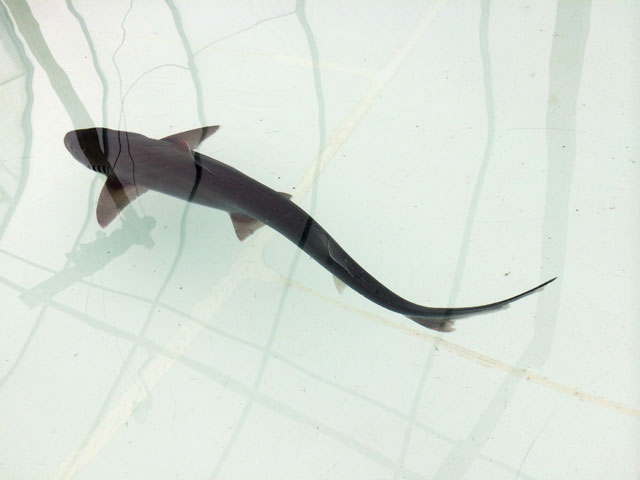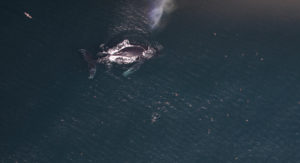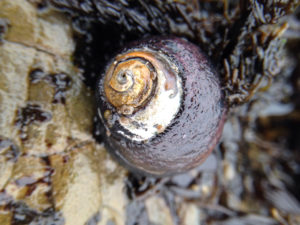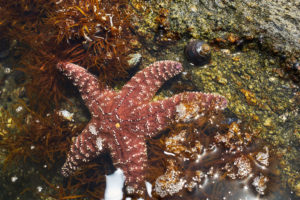This fall, smooth dogfish in a long, bowling alley-shaped brine tank at Woods Hole Oceanographic Institution, in Massachusetts, got to taste the acidified ocean of the future. The problem was, they couldn’t smell it.
While scientists often focus on ocean acidification’s potential impact on shelled animals such as corals or oysters, research by marine biologist Danielle Dixson implies it’s going to be just as much a problem for the world’s fish. In her experiments, sharks seemed to lose their sense of smell when immersed in acidic water simulating what researchers think the oceans will be by the end of this century. Several researchers are now exploring ocean acidification’s potential effect on West Coast species like salmon and rockfish. For her part, Dixson says she has yet to see a fish that’s not harmed by ocean acidification.
“There won’t be winners,” she predicts. “There will be losers and there will be later losers.”
The ocean soaks up more than a quarter of carbon dioxide emissions every day, a hundred tons of CO2 per second. This is beneficial, in that this is a hundred tons per second that doesn’t contribute to global warming, but the big downside is that all of this carbon absorption is changing the ocean’s chemistry. If carbon dioxide emissions continue at their current rate, the oceans’ pH is projected to drop to 7.8 over the next 50 years, and to 7.69 by the end of this century.
Half a pH point might not seem like a lot, but, imagine your cup of apple juice (pH 3.0) has been switched for a mug of apple cider vinegar (pH 2.2) and you’re starting to get a sense of the scale of the ocean’s shift towards the acid end of the spectrum.
Except the fish aren’t just tasting the difference, they’re swimming in it.

The way fish breathe means the ocean spends a lot of time inside fish, to the extent that variations in ocean chemistry could affect fish chemistry. To deal with this, fish have evolved a complicated buffer system that allows them to respond to an acidic environment by temporarily raising their blood pH by increasing the bicarbonate in their bloodstream. An acid ocean means fish will be buffering constantly, and it now appears that the resulting shift in blood chemistry (ironically enough, to the basic end of the spectrum) appears to cause bizarre cognitive side effects after a matter of days.
Scientists once assumed that this buffer system would make fish immune to ocean acidification. “People thought that fish would be okay, so we need to stress about corals and mollusks, which we do need to stress out about,” Dixson says, but now fish are in trouble, too.
“It’s kind of a Catch-22,” Danielle Dixson says. “Their buffering system is what causes the impairment.”
This phenomenon was the focus of Dixson’s research at Woods Hole.
Dixson’s experiment took up most of a large, hangar-like room, but the concept was relatively simple. In one trial, the sharks swam in salt water that approximated the ocean as it is today. The tank was then calibrated to approximate ocean acidity predicted for fifty years from now, and then experiment was run again with water mimicking the acidified oceans expected by the end of this century, assuming CO2 emissions continue at their current rate.
During each trial, two streams of pink-dyed water were piped into the upper end of the tank. One flume was laced with “squid juice”— 400 grams of thawed squid meat steeped in 1 liter of seawater, let set 24 hours, strained, and served—while the other stream was plain salt water.
Sometimes referred to as “swimming noses,” sharks use scent to guide them to their prey, and in ordinary seawater the sharks spent most of their time on the hunt, looking for squid in the squid-scented plume.
With each ratcheting up of the tank’s pH, however, the sharks’ awareness of the squid juice declined. The sharks also showed progressively lower levels of energy, and their natural preference for one side of the tank or the other also disappeared. Some sharks spent the trial swimming aimlessly in figure eights.
When sharks find themselves in acidic water and adjust their blood chemistry to compensate, the change in blood pH shuts off certain receptors on their brain cells, the same receptors we tinker with when we take alcohol, benzodiazepines, or Xanax. Though Dixson didn’t say the sharks were acting drunk, it’s not hard to see their behavior that way—they were swimming erratically, missing their usual cues. In Dixson’s words: “They got stupid.”
Dixson’s findings jive with the work of her former mentor, Philip Munday, at James Cook University, in Australia, who also worked on the Woods Hole shark study. Munday’s research, published in 2009, showed cognitive impairment in coral reef fish exposed to acidic water, with consequent changes in the fishes’ behavior. Coral reef fish became less aware of predators, and their ability to learn declined.
If acidification affects one “swimming nose,” it’s likely to affect many of them. Such as salmon, says Colin Brauner, a zoologist at the University of British Columbia who is studying ocean and freshwater acidification’s effects on one of the West Coast’s most high-profile fish. Because his lab’s report is still under review, Brauner was unable to discuss particulars, but says that the research “implied a negative effect” of ocean acidification on salmon olfactory abilities.
At Moss Landing Marine Laboratories, San Jose State researcher Scott Hamilton recently received a $330,000 National Science Foundation grant to study ocean acidification and juvenile rockfish. Hamilton’s work so far, set to be published in the next month or two, has already uncovered bizarre new side effects of ocean acidification in blue and copper rockfish, including disruptions of fishes’ problem solving ability, their capacity for aerobic exercise, and their swimming speed.
One big missing piece in the research so far is that studies have been limited to the short-term effects of acidified seawater, and there remains a possibility that some fish will adapt to acidic conditions over the course of the next century. After all, sharks and other ancient marine species have experienced acidic oceans in their ancestral past, at times worse than what’s projected for the next hundred years.
The likely catch, however, is the relatively rapid, and perhaps accelerating speed of ocean acidification. Sharks have “never experienced this rate [of change] in their evolutionary time,” Dixson says.
The research so far makes for a bleak outlook, says Michael O’Donnell, a senior scientist at the Oakland-based California Ocean Science Trust. But O’Donnell cautions against an overly dystopian vision of the 21st century. “We’re not talking about a sterilized ocean,” he says. Not all species are necessarily universally affected. Whales, he points out, might be barnacle-free in an acidified ocean, which would make their lives easier.
Exactly what will an acidified West Coast look like? Dixson’s research tells us things are going to be weird, but it’s still unclear how weird. Or how bad. “That’s the question as a scientist I’d most like to know the answer to,” O’Donnell says. “But it’s a hard one to come up with.”
He describes a dive to an undersea CO2 vent, a naturally acidified area of water close to the ocean floor. Closer to the vent itself, the bicarbonate-dependent life forms—snails, urchins, and mollusks—grew more and more scarce. At the same time, the algae that would have normally been kept in check by these creatures grew more and more prevalent. As for the fish? We still don’t know, O’Donnell says. Marine food webs are complex.
“I will say that it will look different,” he says, and emphasizes the significance of this change, even if it’s not ultimately an issue of sharks dying off altogether. “Does it matter if things shift?” O’Donnell asks.
He thinks it does: “People like what they see in the ocean,” he says, “even if many of them don’t see it very often.”





